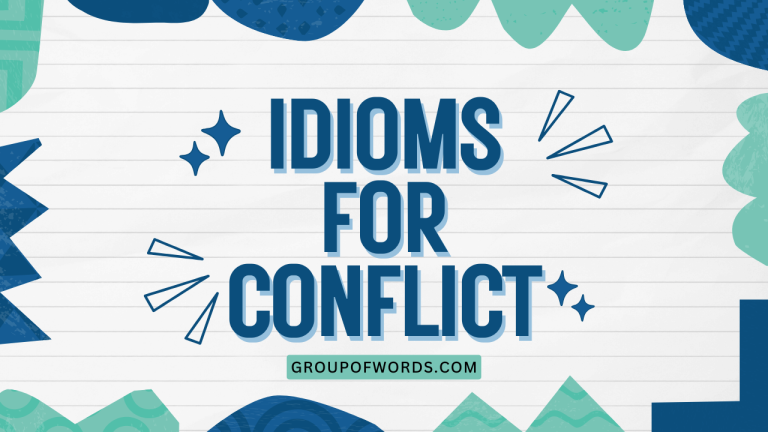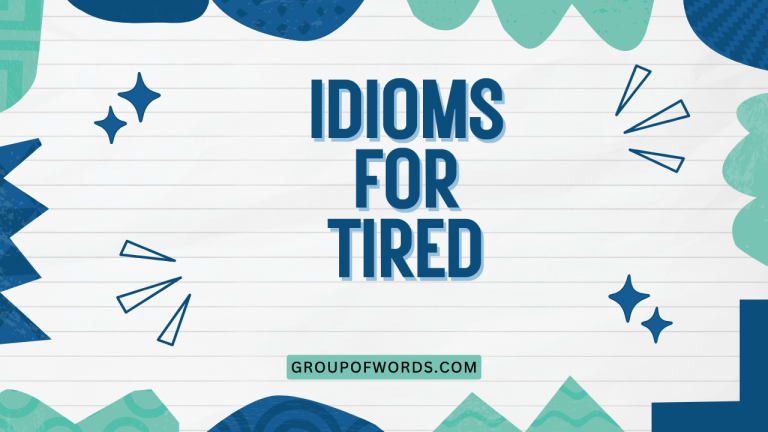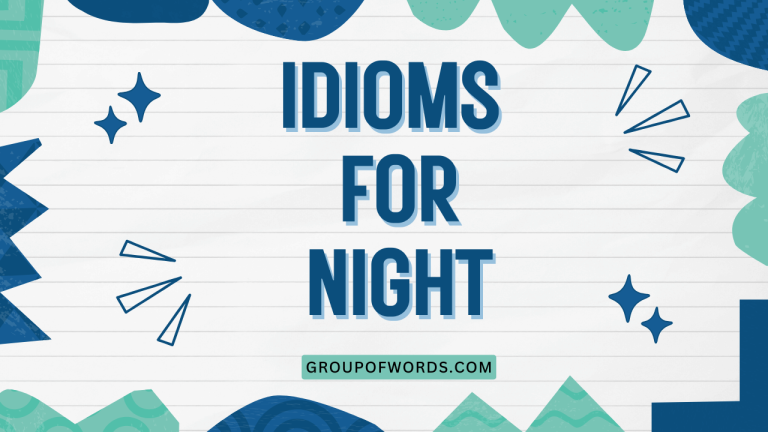Beyond “Nice”: Idiomatic Expressions for Pleasantness
English speakers often reach for the word “nice” to describe something agreeable, but the language offers a rich tapestry of idioms that paint a more vivid and nuanced picture. Mastering these expressions not only enhances your vocabulary but also allows you to communicate with greater precision and flair.
This article delves into a variety of idioms that convey the concept of “nice,” exploring their meanings, usage, and the subtle differences that make them unique. Whether you’re an English language learner or a seasoned speaker looking to refine your linguistic skills, this guide will equip you with the tools to express pleasantness in a more colorful and engaging way.
This article is tailored for English language learners, ESL/EFL students, and anyone interested in expanding their vocabulary and improving their fluency. By understanding and incorporating these idioms into your everyday speech and writing, you can add depth, personality, and authenticity to your communication.
Table of Contents
- Introduction
- Defining “Nice” and Its Idiomatic Alternatives
- Structural Breakdown of Idioms
- Types and Categories of Idioms for “Nice”
- Examples of Idioms for “Nice”
- Usage Rules for Idioms
- Common Mistakes When Using Idioms
- Practice Exercises
- Advanced Topics in Idiom Usage
- Frequently Asked Questions
- Conclusion
Defining “Nice” and Its Idiomatic Alternatives
The word “nice” is a versatile adjective that generally describes something pleasing, agreeable, or satisfactory. However, its broad meaning can sometimes lack the specificity needed to convey a particular shade of pleasantness.
Idioms offer a solution by providing more colorful and evocative ways to express the concept of “nice.”
An idiom is a phrase or expression whose meaning cannot be understood from the ordinary meanings of the individual words. Instead, the phrase has a figurative meaning that is known through common usage. Idioms often reflect cultural nuances and historical contexts, making them an integral part of a language’s character.
When it comes to replacing “nice,” idioms can highlight different aspects of pleasantness, such as kindness, generosity, attractiveness, or simply a general sense of well-being. Understanding the subtleties of these idioms allows you to choose the most appropriate expression for the situation, adding depth and color to your communication.
Structural Breakdown of Idioms
Idioms, by their nature, defy simple structural analysis. Unlike regular phrases where the meaning is derived from the individual words, idioms function as a single unit of meaning.
However, we can still observe some common structural patterns:
- Phrasal Verbs: Many idioms incorporate phrasal verbs (verb + preposition or adverb). For example, “get along with” (to have a good relationship) uses the phrasal verb “get along.”
- Figurative Language: Idioms often employ metaphors, similes, and other figures of speech. For example, “a heart of gold” (to be very kind) uses a metaphor to represent kindness.
- Fixed Expressions: Idioms are typically fixed expressions, meaning the words cannot be changed without altering or destroying the meaning. For example, you can’t say “a heart of silver” and expect it to convey the same meaning.
- Context Dependence: The meaning of an idiom is highly dependent on context. A phrase that is an idiom in one situation may have a literal meaning in another.
Despite these observations, it’s important to remember that idioms are learned through exposure and practice rather than by applying strict grammatical rules. The key is to understand the figurative meaning and the contexts in which the idiom is appropriately used.
Types and Categories of Idioms for “Nice”
To better understand the range of idioms that can replace “nice,” we can categorize them based on the specific aspect of pleasantness they convey:
General Pleasantness
These idioms describe something that is generally pleasing, agreeable, or enjoyable. They don’t necessarily focus on a specific quality like kindness or attractiveness, but rather on a general sense of positivity.
Kindness and Generosity
This category includes idioms that emphasize someone’s good nature, compassion, and willingness to help others. These idioms often highlight acts of kindness and generosity.
Agreeableness and Harmony
These idioms focus on the quality of being easy to get along with, cooperative, and harmonious. They describe individuals who are pleasant to be around and contribute to a positive social environment.
Attractive Qualities
This category encompasses idioms that describe physical attractiveness, charm, and other qualities that make someone appealing or pleasing to the eye.
Examples of Idioms for “Nice”
The following sections provide extensive examples of idioms categorized by the type of pleasantness they convey. Each table includes the idiom, its meaning, and example sentences to illustrate its usage.
General Pleasantness Examples
The following table provides examples of idioms that express general pleasantness. These idioms can be used to describe situations, experiences, or people that are generally agreeable or enjoyable.
| Idiom | Meaning | Example Sentence |
|---|---|---|
| A bed of roses | An easy and pleasant situation | Life isn’t always a bed of roses; sometimes you have to face challenges. |
| A piece of cake | Very easy to do | The exam was a piece of cake; I finished it in half the time. |
| All sunshine and rainbows | Completely positive and pleasant | Their relationship seems to be all sunshine and rainbows, but I wonder if it will last. |
| Coming up roses | Turning out well; being successful | Despite the initial setbacks, everything is coming up roses for the project now. |
| In good shape | In good condition; healthy | The car is still in good shape after all these years. |
| On cloud nine | Extremely happy | She was on cloud nine after receiving the acceptance letter from her dream university. |
| Tickety-boo | Fine; in good order | Everything’s tickety-boo with the arrangements for the party. |
| Right as rain | Perfectly fine; healthy | After a good night’s sleep, I felt right as rain. |
| Smooth sailing | Easy progress; without problems | Once we got past the initial hurdles, it was smooth sailing to the finish line. |
| A walk in the park | Very easy to do | For him, fixing computers is a walk in the park. |
| Sitting pretty | In a fortunate or advantageous position | With their new business booming, they are sitting pretty. |
| Golden opportunity | A very favorable chance or occasion | This job offer is a golden opportunity to advance my career. |
| Living the dream | Experiencing a very enjoyable and successful life | Traveling the world and writing about it – he’s truly living the dream. |
| Like a dream | Extremely pleasant or wonderful | The vacation was like a dream; I didn’t want it to end. |
| Couldn’t be better | In the best possible condition or situation | How are you feeling today? Couldn’t be better, thanks! |
| All to the good | Beneficial or advantageous | The extra training will be all to the good for your performance. |
| A happy camper | Content and satisfied | After getting the promotion, she’s definitely a happy camper. |
| In clover | Living in luxury or ease | Since winning the lottery, they’ve been living in clover. |
| A ray of sunshine | Someone who brings happiness and positivity | Her cheerful attitude is a ray of sunshine in the office. |
| Easy peasy | Very easy; effortless | The recipe is easy peasy; even a beginner can make it. |
Kindness and Generosity Examples
The following table illustrates idioms that describe kindness and generosity. These idioms are used to highlight someone’s good nature, compassion, and willingness to help others.
| Idiom | Meaning | Example Sentence |
|---|---|---|
| A heart of gold | A very kind and generous person | She has a heart of gold; she’s always helping those in need. |
| Good Samaritan | Someone who is helpful and compassionate, especially to strangers | The Good Samaritan stopped to help the stranded motorist. |
| Do a good turn | To do a kind or helpful act | He always tries to do a good turn for his neighbors. |
| Go the extra mile | To do more than what is expected | She always goes the extra mile to help her students succeed. |
| Give the shirt off one’s back | To be extremely generous and willing to give everything | He’s the kind of person who would give you the shirt off his back. |
| Invaluable | Extremely helpful or useful | Her advice was invaluable in helping me make the right decision. |
| Kind-hearted | Having a kind and generous nature | She’s a kind-hearted woman who volunteers at the local shelter. |
| A shoulder to cry on | Someone who offers sympathy and support | He’s always been a shoulder to cry on when I’m feeling down. |
| Benevolent | Well meaning and kindly | The benevolent donor funded the construction of the new hospital wing. |
| Altruistic | Showing a selfless concern for others | Her altruistic actions inspired many to volunteer their time. |
| Big-hearted | Generous and kind | He’s a big-hearted man who always puts others first. |
| Full of the milk of human kindness | Having a compassionate and caring nature | She is full of the milk of human kindness, always ready to lend a helping hand. |
| A soft touch | Someone easily persuaded to give money or help | He’s a soft touch when it comes to charitable donations. |
| Considerate | Thoughtful of others and their feelings | It was very considerate of you to remember my birthday. |
| Gracious | Courteous, kind, and pleasant | She was a gracious host, making sure everyone felt welcome. |
| Humanitarian | Concerned with or seeking to promote human welfare | The organization provides humanitarian aid to refugees. |
| Magnanimous | Generous or forgiving, especially towards a rival or someone less powerful than oneself | The magnanimous leader offered amnesty to his former enemies. |
| Philanthropic | Seeking to promote the welfare of others, especially by donating money to good causes | The family established a philanthropic foundation to support education. |
| Thoughtful | Considerate of others; showing care and attention | It was very thoughtful of you to bring me flowers. |
| Unstinting | Given or giving without restraint; very generous | She provided unstinting support to her family during difficult times. |
| Warm-hearted | Kind, sympathetic, and generous | He’s a warm-hearted man who always makes people feel comfortable. |
| With the best intentions | Acting with good motives, even if the outcome is not ideal | He made the suggestion with the best intentions, even though it wasn’t well-received. |
| A true friend | Someone who is loyal, supportive, and always there for you | She’s a true friend who has always stood by me through thick and thin. |
Agreeableness and Harmony Examples
This table provides idioms that describe agreeableness and harmony. These idioms focus on the quality of being easy to get along with, cooperative, and contributing to a positive social environment.
| Idiom | Meaning | Example Sentence |
|---|---|---|
| Get along with | To have a good relationship with someone | I get along with my colleagues very well; we’re like a family. |
| On the same wavelength | To have similar ideas and understanding | We’re on the same wavelength; we always agree on the best course of action. |
| Easy-going | Relaxed and tolerant in attitude or manner | He’s an easy-going person who doesn’t get stressed easily. |
| A people person | Someone who enjoys being around people and is good at interacting with them | She’s a people person, so she’s perfect for this customer service role. |
| Agreeable | Pleasing or willing to agree | He was an agreeable companion for the trip. |
| A good sport | Someone who accepts defeat or disappointment gracefully | Even though she lost the game, she was a good sport about it. |
| A team player | Someone who works well with others to achieve a common goal | He’s a team player who always puts the group’s needs first. |
| Amicable | Having a spirit of friendliness; without serious disagreement | They reached an amicable agreement after the negotiations. |
| Congenial | Pleasant because of personality qualities or interests that are similar to one’s own | The atmosphere at the conference was very congenial. |
| Cooperative | Willing to work together or be helpful | The students were cooperative and completed the project on time. |
| Diplomatic | Skilled at dealing with sensitive matters or people | She handled the situation with a diplomatic approach, avoiding any conflict. |
| Even-tempered | Not easily annoyed or angered | He’s an even-tempered person who rarely loses his cool. |
| Good-natured | Having a pleasant and friendly disposition | She’s a good-natured woman who always has a smile on her face. |
| Harmonious | Free from disagreement or dissent | The choir created a harmonious blend of voices. |
| Like-minded | Having similar tastes, opinions, or interests | The club attracts like-minded individuals who share a passion for photography. |
| Non-confrontational | Avoiding conflict or confrontation | He prefers a non-confrontational approach to resolving disputes. |
| Patient | Able to accept delays or suffering without becoming annoyed or anxious | The teacher was very patient with the struggling students. |
| Placid | Not easily upset or excited | The placid lake reflected the clear blue sky. |
| Receptive | Willing to consider or accept new ideas or suggestions | The manager was receptive to the employees’ feedback. |
| Sociable | Willing to talk and engage in activities with other people; friendly | She’s a sociable person who enjoys going to parties. |
Attractive Qualities Examples
The following table provides idioms that describe attractive qualities. These idioms encompass physical attractiveness, charm, and other qualities that make someone appealing or pleasing to the eye.
| Idiom | Meaning | Example Sentence |
|---|---|---|
| Easy on the eyes | Pleasing to look at; attractive | She’s very easy on the eyes; everyone notices her when she walks into a room. |
| A sight for sore eyes | Someone or something that is very welcome because they arrive after a long wait or when they are badly needed | After being lost in the woods for hours, the rescue team was a sight for sore eyes. |
| As pretty as a picture | Very attractive or beautiful | She looked as pretty as a picture in her wedding dress. |
| Charm the pants off someone | To be very charming and persuasive | He could charm the pants off anyone; he’s a natural salesman. |
| Alluring | Powerfully attractive or charming | The city’s alluring nightlife draws tourists from all over the world. |
| Captivating | Capable of attracting and holding interest; charming | Her captivating performance held the audience spellbound. |
| Dazzling | Extremely impressive, beautiful, or skillful | The dancer’s dazzling technique left the audience in awe. |
| Enchanting | Delightfully charming or attractive | The enchanting forest seemed to come alive in the moonlight. |
| Fetching | Attractive or appealing | She looked fetching in her new dress. |
| Glamorous | Attractive in an exciting and special way | The glamorous actress graced the red carpet. |
| Gorgeous | Very beautiful or attractive | The sunset over the ocean was absolutely gorgeous. |
| Irresistible | Too attractive and tempting to be resisted | The chocolate cake was irresistible; I had to have a slice. |
| Lovely | Exquisite in beauty; very pleasing | She has a lovely smile that lights up her face. |
| Radiant | Shining or glowing brightly; beautiful | The bride looked radiant on her wedding day. |
| Stunning | Extremely impressive or attractive | The view from the mountaintop was absolutely stunning. |
| Winning | Attractive or appealing | Her winning personality made her popular with everyone. |
| With it | Fashionable and up-to-date | She always knows the latest trends; she’s very with it. |
| Prepossessing | Attractive or appealing in appearance | He has a prepossessing demeanor that puts people at ease. |
| Statuesque | (of a woman) attractively tall and dignified | The statuesque model commanded attention on the runway. |
Usage Rules for Idioms
Using idioms correctly requires attention to several key rules:
- Context: Always consider the context of the conversation or writing. An idiom that is appropriate in one situation may be inappropriate in another.
- Audience: Be mindful of your audience. Some idioms are more common in certain regions or social groups. Avoid using idioms that your audience may not understand.
- Formality: Idioms are generally more informal than standard English. Avoid using them in formal writing or presentations unless you are confident that they are appropriate.
- Literal vs. Figurative: Be aware of the difference between the literal and figurative meanings of an idiom. Using an idiom literally can lead to confusion or misinterpretation.
- Overuse: Avoid overusing idioms. Too many idioms in a short space can make your writing or speech sound unnatural or forced.
It is helpful to listen to native English speakers and read English literature to get a feel for when and how idioms are used appropriately. Pay attention to the tone, context, and audience to ensure that your use of idioms is effective and natural.
Common Mistakes When Using Idioms
Learners often make common mistakes when using idioms. Here are some frequent errors and how to avoid them:
| Incorrect | Correct | Explanation |
|---|---|---|
| She has a gold of heart. | She has a heart of gold. | The words in the idiom “heart of gold” are fixed and cannot be changed. |
| He did a good turn yesterday to me. | He did me a good turn yesterday. | The word order in the idiom “do a good turn” is important. |
| They are in the same wave length. | They are on the same wavelength. | The correct preposition is “on,” not “in.” |
| The exam was a cake of piece. | The exam was a piece of cake. | The words in the idiom “piece of cake” are fixed. |
| She gave the shirt from her back. | She gave the shirt off her back. | The correct preposition is “off,” not “from.” |
| He’s a people’s person. | He’s a people person. | The correct form is “people person,” without the possessive “‘s.” |
| I’m feeling under the weather. | I’m feeling a bit under the weather. | While “under the weather” is correct, adding “a bit” can soften the statement. |
By being aware of these common mistakes, you can avoid errors and use idioms more confidently and accurately.
Practice Exercises
Test your understanding of idioms with these practice exercises. Choose the correct idiom to complete each sentence.
- After a long day at work, seeing my family was __________.
- a piece of cake
- a sight for sore eyes
- a bed of roses
Answer: b) a sight for sore eyes
- He’s always willing to help others; he has __________.
- a heart of gold
- a bed of roses
- a walk in the park
Answer: a) a heart of gold
- The project went smoothly; it was __________.
- all sunshine and rainbows
- smooth sailing
- a piece of cake
Answer: b) smooth sailing
- She’s very __________ and gets along with everyone.
- easy-going
- fetching
- stunning
Answer: a) easy-going
- Winning the lottery was __________ for them.
- living the dream
- a ray of sunshine
- a walk in the park
Answer: a) living the dream
- He __________ his way into the meeting with his charm.
- did a good turn
- charmed the pants off
- went the extra mile
Answer: b) charmed the pants off
- She’s __________ after getting the promotion.
- a happy camper
- in clover
- on cloud nine
Answer: a) a happy camper
- It was __________ of you to remember my birthday.
- considerate
- gracious
- humanitarian
Answer: a) considerate
- They are __________ and always agree on everything.
- on the same wavelength
- getting along with
- agreeable
Answer: a) on the same wavelength
- The view from the top of the mountain was absolutely __________.
- fetching
- stunning
- winning
Answer: b) stunning
Exercise 2: Fill in the blanks with the appropriate idiom from the box below.
(Piece of cake, get along with, good Samaritan, a bed of roses, on cloud nine, go the extra mile, a heart of gold, easy on the eyes, smooth sailing, right as rain)
- The test was a __________. I finished it in 20 minutes.
- She has __________; she is always helping people in need.
- After a good night’s sleep, I felt __________.
- He always __________ to help his students succeed.
- Life is not always __________, sometimes you have to face challenges.
- They __________ very well; they are like best friends.
- She was __________ after receiving the acceptance letter.
- The project was __________ after the initial challenges.
- He is __________; everyone admires his good looks.
- The __________ stopped to help the injured animal.
Answers:
- Piece of cake
- A heart of gold
- Right as rain
- Go the extra mile
- A bed of roses
- Get along with
- On cloud nine
- Smooth sailing
- Easy on the eyes
- Good Samaritan
Advanced Topics in Idiom Usage
For advanced learners, understanding the nuances of idiom usage can further enhance their proficiency. Here are some advanced topics to consider:
- Regional Variations: Idioms can vary significantly by region. What is common in American English may be unfamiliar in British English, and vice versa.
- Historical Context: Many idioms have historical origins that shed light on their meaning and usage. Understanding the history of an idiom can deepen your appreciation of the language.
- Creative Adaptation: While idioms are generally fixed expressions, skilled writers and speakers sometimes adapt them creatively for rhetorical effect. This requires a deep understanding of the idiom’s meaning and usage.
- Translation Challenges: Idioms are notoriously difficult to translate directly. A good translation must capture the figurative meaning of the idiom in a way that is natural and appropriate in the target language.
By exploring these advanced topics, you can develop a more sophisticated understanding of idioms and their role in English communication.
Frequently Asked Questions
- What is the difference between an idiom and a proverb?
An idiom is a phrase whose meaning cannot be understood from the literal meanings of the individual words (e.g., “kick the bucket” means “to die”). A proverb is a short, well-known saying that expresses a general truth or piece of advice (e.g., “Early to bed, early to rise, makes a man healthy, wealthy, and wise”).
- How can I learn more idioms?
The best way to learn idioms is through exposure. Read English books, watch English movies and TV shows, and listen to English conversations. Pay attention to the context in which idioms are used and try to use them yourself in your own speech and writing. Flashcards and online resources can also be helpful.
- Is it okay to use idioms in formal writing?
Generally, idioms are more appropriate for informal writing and speech. In formal writing, it’s usually best to use more direct and literal language. However, there are exceptions, and some idioms may be acceptable in certain formal contexts. Consider your audience and the tone of your writing.
- What should I do if I don’t understand an idiom?
If you encounter an idiom that you don’t understand, try to guess its meaning from the context. If that doesn’t work, look it up in a dictionary or online resource. It can also be helpful to ask a native English speaker for clarification.
- Are idioms the same in all English-speaking countries?
No, idioms can vary significantly between different English-speaking countries and regions. What is common in one country may be unfamiliar or have a different meaning in another. Be aware of these regional variations and adjust your language accordingly.
- How can I avoid misusing idioms?
To avoid misusing idioms, pay attention to the context in which they are used, be mindful of your audience, and avoid overusing them. It’s also helpful to study common mistakes and practice using idioms in your own speech and writing. If you’re unsure about the meaning or usage of an idiom, it’s best to err on the side of caution and use more direct language.
- Why are idioms so difficult to translate?
Idioms are difficult to translate because their meaning is figurative and not literal. A direct translation of the individual words in an idiom will often make no sense in another language. A good translation must capture the figurative meaning of the idiom in a way that is natural and appropriate in the target language, which may require using a different idiom or expression altogether.
- Are there any online resources for learning idioms?
Yes, there are many online resources for learning idioms. Some popular options include online dictionaries (such as Merriam-Webster and Oxford), idiom websites (such as UsingEnglish.com and TheFreeDictionary.com), and language learning apps (such as Duolingo and Memrise). These resources often provide definitions, examples, and quizzes to help you learn and practice idioms.
Conclusion
Mastering idioms that convey the concept of “nice” can significantly enhance your English communication skills. By understanding the nuances of these expressions, you can add depth, color, and authenticity to your speech and writing.
This article has provided a comprehensive overview of various idioms, categorized by the specific aspect of pleasantness they convey, along with usage rules, common mistakes to avoid, and practice exercises to reinforce your learning.
Remember that learning idioms is an ongoing process that requires exposure, practice, and a keen ear for the language. Don’t be afraid to experiment with new idioms and to ask for clarification when you’re unsure of their meaning or usage.
With dedication and persistence, you can expand your vocabulary and become a more confident and effective communicator in English. Keep practicing, keep listening, and enjoy the journey of language learning!






